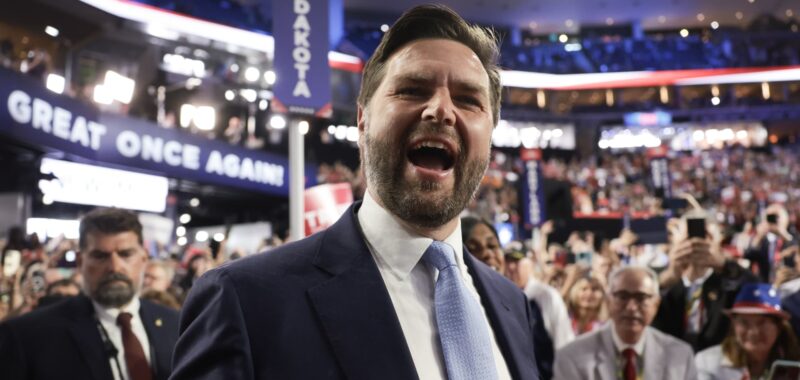Wall Street is weighing in on how Donald Trump ‘s pick for vice president could potentially influence some major policy decisions if the former president wins reelection. Trump named Ohio Senator J.D. Vance as his running mate Monday. Best known as the author of “Hillbilly Elegy,” a memoir that recounts his upbringing, Vance is also a graduate of Yale Law School and previously worked in the venture capital space with Peter Thiel . Stifel’s Brian Gardner called the selection “yet another sign that this isn’t your father’s Republican Party.” He added, Vance is “among the most interesting people in American politics.” “Sen. Vance’s nomination probably says more about the long term direction of the GOP than it does about this election and it’s a move away from capital and towards labor,” the chief Washington policy strategist wrote. To be sure, vice presidents historically don’t have a significant impact on policy decisions, noted New Street Research’s Blair Levin. “But, as Vance has demonstrated in his quick rise, the past may not be prologue,” he wrote. And of course, being the Vice-President to a 78-year-old man suggests material odds of becoming President.” Here’s what a Vance vice presidency could mean for technology companies, cryptocurrencies and other key policy decisions. Technology While Vance’s experience in the technology space is a “clear positive,” the senator has criticized big tech’s dominance and called for the breakup of Alphabet , BTIG’s Isaac Boltansky said. At a February event, Vance raised concerns about Alphabet and Meta Platforms , saying that the technology behemoths have hurt tech innovation and pose potential risks to democracy. Vance has also called for an end to Section 230 protections for larger companies. The law has protected Facebook, Twitter and other online platforms from liability for users’ posts and allows them to moderate these discussions without being held to the same standards as publishing companies. “From a practical policy perspective, we continue to believe that specific big tech antitrust headwinds will continue if we see a second Trump administration, but there would be an overall thawing in the M & A regulatory landscape that proves beneficial for deal activity,” Boltansky wrote. TD Cowen’s Paul Gallant said Vance has also appeared to show “strong support” toward current Federal Trade Commission Chair Lina Khan, calling her the “best person” within Biden’s administration. “We doubt a reelected Pres. Trump would completely delegate the tech policy agenda to anyone given his personal interest in that space,” Gallant wrote. “But we believe Sen. Vance would be a very important voice â perhaps decisive on some matters â in view of experience in the tech sector … and of tech policy.” Cryptocurrencies Many Wall Street analysts also expect Vance to maintain a favorable stance toward digital assets under a Trump White House. “Vance has been a strong supporter of cryptocurrency and has promoted legislation to clarify the federal regulatory jurisdiction of digital assets, which have been promoted by the industry,” noted Raymond James analyst Ed Mills. Cryptocurrencies rallied Monday as the odds of a Trump win rose on the heels of Saturday’s assassination attempt . Coinbase , Microstrategy , Riot Platforms and other crypto stocks jumped during the session. These stocks should fare well given Trump’s favorable view toward digital assets, Boltansky said. Vance has also shown support for the sector, cosponsoring legislation geared toward stopping regulators from attempting to prevent banks from working with “disfavored industries,” he added. “A Trump victory would lead to the regulatory landscape for digital assets becoming more supportive almost immediately at the market regulators and some bank regulators, but there is always some lead time to get people in place and actually shift policy,” Boltansky said. Banking Vance could also play a big role in the banking sector if Trump gets reelected come November. As a member of the Senate Banking Committee, Vance has worked with Senator Elizabeth Warren on clawing back compensation for big bank executives when a failure occurs. Analysts also noted that he’s raised concerns about credit card fees and cosponsored a bill that targets issuers such as Visa and Mastercard . While there’s no guarantee that these bills become law, they represent “important markers for the shift among Republicans,” wrote Stifel’s Gardner. Wolfe Research’s Tobin Marcus said Vance has supported eliminating electric vehicle tax credits available through the Inflation Reduction Act, and has proposed credits supporting U.S.-made gas vehicles. “This is obviously not going to happen in its proposed form, but it underscores our longstanding view that there are significant risks of repeal for these programs under a Republican trifecta,” he said.

